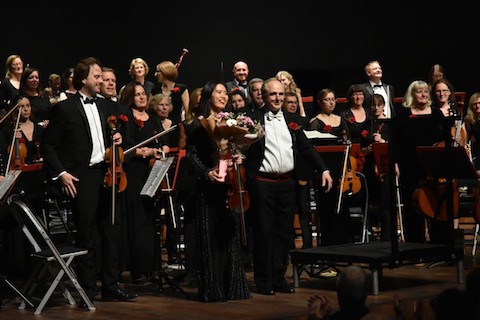 Abraham Lincoln
If given the truth, the people can be depended upon to meet any national crisis...
Abraham Lincoln
If given the truth, the people can be depended upon to meet any national crisis...
 Guildford news...
for Guildford people, brought to you by Guildford reporters - Guildford's own news service
Guildford news...
for Guildford people, brought to you by Guildford reporters - Guildford's own news service
Guildford Symphony Orchestra’s Uplifting Centenary Concert
Published on: 19 Nov, 2019
Updated on: 20 Nov, 2019
Contributed review by Ian Codd
The Guildford Symphony Orchestra was founded in 1919 by Claud Powell and is now celebrating its centenary.
During all that time it has, astonishingly, had only three conductors. Under its present conductor, Darrell Davison, it gave a special centenary concert on Saturday, November 16, at G Live, culminating in a performance of Beethoven’s Choral Symphony.

Guildford Symphony Orchestra’s centenary confer at G Live on Saturday, November 16.
The orchestra was joined for the occasion by singers from Guildford Choral, which boasts an even longer history, tracing its origin back to 1839.
The concert opened with the overture to Wagner’s opera The Mastersingers of Nuremberg.
The overture is a majestic piece, depicting not only the solemnity of the mastersingers but also the love between Eva and Walther.
It was given a splendid and stirring performance of great breadth, with the choir joining in the grand festive ending.
This was followed by Handel’s coronation anthem Zadok the Priest, another piece of majestic grandeur. The choir, which sang with great conviction, producing a full and resonant sound, enhanced the experience by performing from memory.
The orchestra was then joined by Joo Yeon Sir, a Korean-born British violinist, in Mendelssohn’s violin concerto.
This is essentially a lyrical concerto, and the soloist’s warm tone and beautiful control of phrasing were ideally suited to the music, though she also displayed abundant virtuosity, especially in the last movement.
The lyrical slow movement was played with great depth of feeling.
The playful finale was brilliantly executed, with the close rapport between soloist and orchestra very evident.
The second half of the concert was devoted to Beethoven’s ninth symphony, the Choral Symphony.
To perform this long and difficult work is a huge challenge for any amateur orchestra and choir, but it was brought off magnificently by the Guildford musicians.
The first movement was powerful and full of dramatic tension, while the relentless rhythmic energy of the second movement scherzo maintained the strong forward impulse.
The lengthy and lyrical slow movement was played with a sustained intensity that never flagged. Beethoven’s highly original final movement begins in a hesitant, searching mood, until the entry of the bass soloist, exhorting the players and singers to find ‘more pleasant and joyful notes’.
The character of the music then changes as the choir enters, supported by four soloists, and the great melody of the ‘Ode to Joy’ gradually dominates the rest of the movement.
Darrell Davison expertly marshalled his large forces in this choral finale to produce a thrilling and triumphant conclusion to Beethoven’s last symphony, as well as to this celebratory concert.
The final moments of this exuberantly optimistic music were indeed uplifting.

See Dragon story: GBC’s Explanation of Major Land Sale Notice Error ‘Borders on Arrogant’ Says Councillor






Recent Articles
- Zero Re-opens Uptown
- Letter: I Hope the New CEO Will Reflect on the Constructive Advice
- Campaign to Encourage Visitors to the Surrey Hills To Go by Train
- Police Commissioner Office Ordered to Remove Social Media Messages
- Police and Crime Commissioner Candidate Interview – Kate Chinn
- Guide to Telephone Befriending Services for Older People
- Stage Dragon: Sleuth at the Yvonne Arnaud Theatre
- Guildford Lido All Set for the 2024 Season
- Appointment of Permanent Joint Strategic Director of Finance Confirmed
- Police and Crime Commissioner Candidate Interview – Alex Coley


Search in Site
Media Gallery
Dragon Interview: Local Artist Leaves Her Mark At One of England’s Most Historic Buildings
January 21, 2023 / No Comment / Read MoreDragon Interview: Lib Dem Planning Chair: ‘Current Policy Doesn’t Work for Local People’
January 19, 2023 / No Comment / Read MoreA3 Tunnel in Guildford ‘Necessary’ for New Homes, Says Guildford’s MP
January 10, 2023 / No Comment / Read More‘Madness’ for London Road Scheme to Go Ahead Against ‘Huge Opposition’, Says SCC Leader
January 6, 2023 / No Comment / Read MoreCouncillor’s Son Starts Campaign for More Consultation on North Street Plan
December 30, 2022 / No Comment / Read MoreCounty Council Climbs Down Over London Road Works – Further ‘Engagement’ Period Announced
December 14, 2022 / No Comment / Read MoreDragon Interview: GBC Reaction to the Government’s Expected Decision to Relax Housing Targets
December 7, 2022 / No Comment / Read MoreHow Can Our Town Centre Businesses Recover? Watch the Shop Front Debate
May 18, 2020 / No Comment / Read More






Recent Comments